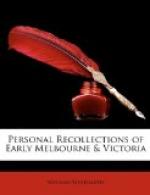Instead of rising with the gold, houses and lands in Melbourne actually fell, and considerably too, in the first confusion, when multitudes were selling off or letting at anything they could get, in order to be off to the diggings. There came, however, a rapid recovery a few months after. My friend Mr. Henry Miller, sitting next me in the Legislature, told me one day that two owners of cottages, to whom he had lent 80 pounds each, upon their respective security, had begged him six months ago to take over the said property in payment, and let them be off at once to the common goal of the day; that he had charitably done so, and that he had just resold these houses for 1,000 pounds each.
When the tide began its upward turn, a Mr. O’Farrell, a quiet unpretending house agent and rent collector (one of whose sons afterwards came to so bad an end), made promptly a large fortune by buying up leases or fee-simples, and in an incredibly short time re-disposing of them at a great advance.
EARLY BALLARAT.
“All that glisters is not gold.”
—Merchant of Venice.
Let me begin upon early Ballarat by stating, what many may now have forgotten, namely, that the original and native name was Balaarat, or Ballaarat, which was the pronunciation then, and for some years after. But our English way is to put the emphasis on the first part of a polysyllabic word. I have long remarked this practice, comparing it with that of races of inferior, or more or less barbarous condition, who, as in countless other examples in Australia, and still more strikingly in New Zealand, and generally, I think, over the world, lay the emphasis on or towards the end of the word. What does it mean? I arrived at my solution. The emphatic ending best preserves the whole word. The barbarous, with few ideas, give surpassing importance to words; while the civilized, under the crowd of ideas, disregard words except as mere vehicles, and traverse them easiest by the early emphasis, to say nothing of dropping the after part entirely when troublesomely long. The Turanian, or lowest class of language, as Professor Max Muller tells us, preserves its root-words for ever, tacking one to another, but never losing the full sound of each; while all sorts of word “jerry mandering” liberties go on in the highest class. I ventured to propound my theory to my linguistic friend, Mr. Hyde Clarke; but he found so many divergencies in Latin and Greek and Hebrew, and what not, that I was driven to a partial reconstruction. It was the busy as well as civilized race that scamped the words. The Greeks and Romans—that portion of them that made society or the public opinion, and that consequently governed the language—abhorred the vulgar hurry of business life, and thus gave their words a better chance of unmutilated life. I have not yet been driven out of this final theory.




